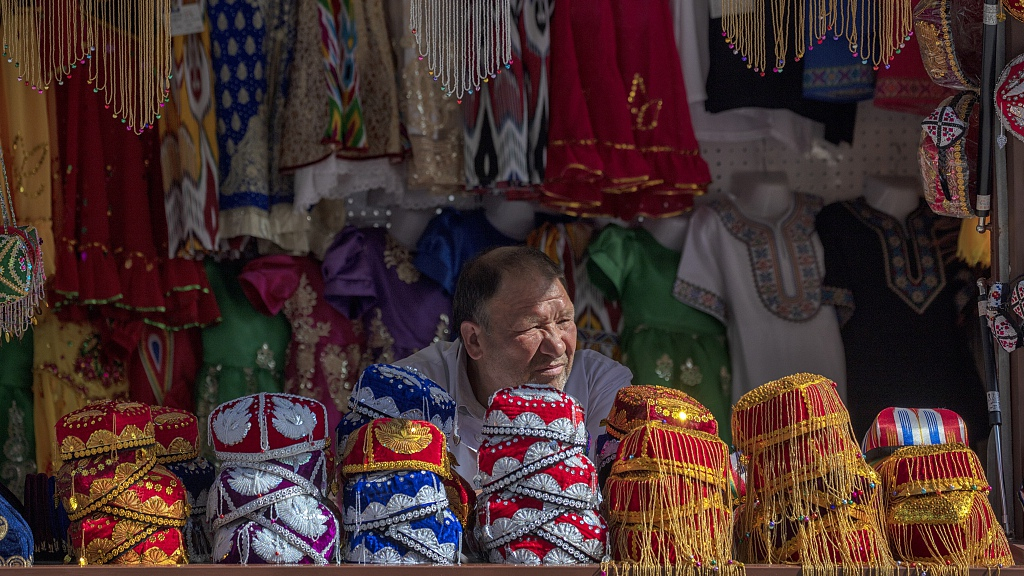
A stand selling local costume in Urumqi, the capital of northwest China's Xinjiang Uygur Autonomous Region, September 20, 2018. /VCG Photo
A stand selling local costume in Urumqi, the capital of northwest China's Xinjiang Uygur Autonomous Region, September 20, 2018. /VCG Photo
Editor's Note: Huang Jiyuan is an opinion editor with CGTN Digital. The article reflects the author's opinions, and not necessarily the views of CGTN.
The Uygur Intervention and Global Humanitarian Unified Response Act of 2019 passed by the U.S. House of Representatives on December 3, which is a revamped version of the Uygur Human Rights Policy Act passed by the Senate earlier this year, is the United States' repeating of its past foreign policy mistakes on an issue that it has the least authority to speak on.
In the past two decades, the United States has done no shortage of telling other countries how to govern and other people how to live. Looking at today's Middle East and Central Asia, you'll get an overview of the result. Afghanistan has been ruined by the U.S. war and occupation. Iraqis are suffering from a weak central government that cannot translate energy profits into social welfare. Countering terrorism, the "ultimate goal" of U.S. presence in the Middle East, hasn't succeeded, due to the region's chaos and instability.
This is the result of U.S. intervention. On each and every one of these occasions, the United States went in claiming to be fighting for the well-being and freedom of locals. But in each and every one of these countries, the U.S. has left nothing but destroyed homes, shattered families, and governments that cannot govern.

A civilian running away from a battle in Syria. The country has been in turmoil for years with no resolution in sight. /VCG Photo
A civilian running away from a battle in Syria. The country has been in turmoil for years with no resolution in sight. /VCG Photo
So can we expect U.S. intervention in Xinjiang to be any different? Well, probably yes, and it would be worse.
While pointing fingers at China on the governance of minority groups, the U.S. doesn't even have a solution to its own long-term domestic racial and ethnic strife. Political elites in Washington have always preached that they are doing everything they can to fix it. But, the systematic discrimination against minorities have not changed in any meaningful way.
According to the U.S. Census Bureau, the median income for African American households in 2018 was 41,361 U.S. dollars, while the average for a white household was 70,642 dollars. The Economist published an article in September this year stating that African American in the United States is "disproportionately poor." More than 20 percent of African Americans live in poverty, and only a tenth of white Americans live in similar conditions.
The median black household wealth is one-tenth of a white household, the same ratio as it was 50 years ago. The discrimination is exacerbated by the high incarceration rate of minorities. According to Pew Research Center, African Americans and Hispanics account for 28 percent of U.S. adult population, but 56 percent of sentenced prison population.
The simple question here is: Can a country suffering from egregious and long-term (in U.S. case, centuries) racial and ethnic discrimination provide any credible solution to other countries on their governance of heavily minority-populated regions?

Mourners embrace as they wait to enter Stephon Clark's funeral in Sacramento, California, March 29, 2018. Stephon Clark, an unarmed African American, was shot and killed by police on March 18, 2018 at his grandmother's home. /VCG Photo
Mourners embrace as they wait to enter Stephon Clark's funeral in Sacramento, California, March 29, 2018. Stephon Clark, an unarmed African American, was shot and killed by police on March 18, 2018 at his grandmother's home. /VCG Photo
You'd expect the United States would learn from its past failures in foreign intervention and its ability to solve racial and ethnic issues. You'd expect that after shattering social fabrics in numerous countries in the Middle East and wreaking havocs on the locals' lives, perhaps the U.S. would reflect on its failures and understand that it doesn't know the best when it comes to other people's ways of life. And given the racial and ethnic strife within the U.S. society, it would realize that it is not the best spokesperson on minority rights and treatment.
However, the U.S. wouldn't.
This is the central problem for U.S. politicians – they don't learn from the past. And they also don't accept current progress. At the same time they are stuck in their own set of perceptions of the world and self-indulgent moral superiority. The Chinese government has brought stability and economic development to Xinjiang while respecting the Uygur people's tradition, religion, and history. The bill, touted to be a champion for human rights, is devoid of facts and reality. It is nothing more than a product of U.S. politicians' long-held bias – a result of their inability to learn from their history and their own problems.
Governing any region with heavy minority-population is a daunting task, Xinjiang is a prime example of that. The achievements made in the region should be celebrated by all people, not demeaned by biases from Washington. And a country that neither learn from its past nor from its current conditions has no credibility nor the moral authority to speak on Xinjiang.
(If you want to contribute and have specific expertise, please contact us at opinions@cgtn.com.)